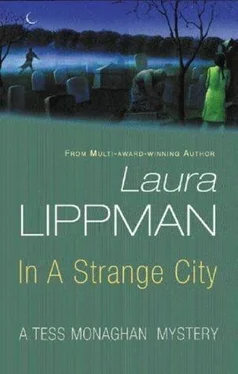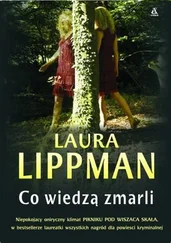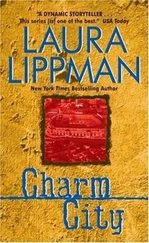Finally, Tess was learning much about another dead man, courtesy of the Beacon-Light. The victim had been identified, and the newspaper continued to go whole hog on the story-throwing bodies at it, in the parlance of the newsroom.
The vic’s name was Bobby Hilliard, and he would have been twenty-nine if he had managed to live another two months. He had worked at the kind of restaurants that Tess patronized only in her palmist days, one-name establishments that sounded like places she could barely afford to vacation: Hampton’s, Charleston’s, Savannah’s. His last port of call had been the Prime Rib. Originally from Pennsylvania, he had graduated from the University of Maryland six years earlier with a bachelor’s degree in English and a master’s degree in library science. But he had been a waiter for as long as anyone could remember.
The newspaper had managed to procure a photograph of the dead man. Tess studied this. She knew the routine, knew how reporters talked parents and friends into giving up a cherished photo, how they promised to take good care of it, to send it back by registered mail. She knew how easily they broke such promises, how the photos ended up, bent and creased, wedged in a desk drawer. This photo appeared to be a cheap snapshot, and she could swear Bobby Hilliard looked irritated at being caught on film. His face and eyes were narrow, and he was terribly pale, or the photograph was simply overlit. He had a drink in his hand and wore a white dress shirt, bow tie askew. He could have been at a wedding, but Tess thought it was more likely he was grabbing a drink after his shift had ended.
Why does a man with a college degree end up waiting tables? Probably because it paid better than library work, and the patrons who patronized you at least washed first. Still, Bobby Hilliard had seemed peripatetic even by the standards of this nomadic class, changing jobs every three months or so.
Why had he been at Poe’s grave? The Beacon-Light, lacking explanations, offered up Poe-ish quotations about loneliness and solitude and midnights dreary. Former co-workers weighed in with the usual noninformation: “quiet guy,” “kept to himself,” “dependable.” Just once, Tess would like to read a story where someone said, “He was a jerk, and we’re not the least bit surprised someone finally offed him.” She was beginning to think “quiet guy/kept to himself” was the consequence of an increasingly incurious planet, where no one noticed anyone but themselves. How could it be that the Blight had found a photo but no real friends to mouth platitudes about the dead man? As for Hilliard’s parents, en route to Baltimore to claim their son’s body, they had managed to avoid the media so far. But, the Beacon-Light teased, Rainer was promising “press availability” at one o’clock today.
Tess looked up from the newspaper and smelled the roses, then sniffed the cognac. “Not a completely bone-headed move on Rainer’s part,” she told Esskay On a slow Sunday, such an event stood a good chance of dominating the evening newscasts and the next day’s front pages. But what would such a circus yield beside videotape and ink? Rainer wasn’t putting the grieving parents in front of the press because he thought reporters’ insightful questions would elicit information he had failed to get. Either Rainer believed the killer was vulnerable to contrition or he was one desperate cop, with one of the biggest red balls in years and no clue how to handle it.
Both things could be true. The only way to know was to go to the press conference.
Of course, it would be foolhardy for Tess to show up, putting herself squarely in Rainer’s sights, confirming his suspicions about her. If she were smart, she’d take the afternoon off, play with her dog and her boyfriend, and catch up on the story the next day, just like the rest of Baltimore.
But Tess preferred her reality unfiltered, without anyone standing between her and the event, telling her what it all meant. Besides, the presser was a guaranteed mob scene, big as a presidential news conference, with risers for the camera crews and reporters from throughout the country. What were the odds that Rainer would even notice her, lurking in the back? She’d get started on her Sunday soon enough. She was no workaholic.
Or so she told herself as she uncapped the cognac for another sniff, fingered a rose petal, and tried to imagine where someone had found such perfect blooms in the dead of winter.
Rainer saw her immediately, as if his eye was trained to spot her braid at a hundred yards, but he was too distracted to do more than glare. Tess tried to fit a world of nonchalant meaning into her responding shrug. Just passing by, saw my buddy Herman Peters, the police reporter, saw the crowd, couldn’t help being curious. It’s public property. Sue me. Even if Rainer understood her body language, he clearly didn’t buy any of it. His scowl told her the bill would come due later.
But for now, Bobby Hilliard’s parents were coming into War Memorial Plaza-the media crowd was so great that the news conference had been forced outside, between the huge Depression-era horses on the plaza opposite City Hall-and Rainer was completely focused on them as they moved toward the podium and the little garden of microphones that had sprouted there. The Hilliards walked stiffly, as if they had been in a car accident.
“Good afternoon,” prompted one of the female reporters, who may or may not have been local. Oh, she was clearly local -she didn’t have the shiny-serious finish that network news babes develop when they make the leap-but she could have been from Baltimore or Washington, Pittsburgh or Philadelphia. They all looked alike to Tess.
The Hilliards nodded a greeting, and stared mutely into the cameras. Tess realized they did not know what was expected. They had not absorbed, as so many citizens had, the media’s protocol for personal tragedy. Television has boiled grief down to the essentials over the years. How do you feel? the reporters ask those who have survived, and the responses are supposed to be Cat-in-the-Hat simple: sad, mad, bad, glad. The grieving tear up on cue, they shake their fists at the camera, they vow revenge, they threaten lawsuits. They know what to do, because they have seen other people do it. And because they do it too, future victims know how to behave when their turn comes.
But Bobby Hilliard’s parents didn’t know this game, much less how to play it. Gazing numbly at the reporters, they might have been the ones under arrest. The reporters stared back, unsure of how to proceed in the face of such quiet dignity. Maybe Rainer did know what he was doing. If the killer was capable of feeling anything, the Hilliards would break his or her heart.
“This is Webber and Yvonne Hilliard,” Ranier said at last, “from Pennsylvania.”
“Vonnie,” whispered Mrs. Hilliard, a thin woman in a navy print dress and an old-fashioned navy wool coat. Her Sunday best, clearly, yet she still might have walked straight out of a Dorothea Lange portrait from the thirties. She had that kind of narrow weatherworn face. “No one ever calls me Yvonne.”
“They have come down to claim their son’s body and take him back for burial in Pennsylvania -”
“Do you know when that will be?” called out a reporter, an out-of-towner. Tess saw the gears clanking in his feverish mind: Funerals were always good for footage, and the two-graves visuals were a surefire winner. She could write his hackneyed copy for him: Bobby Hilliard, who died in one cemetery, was buried in another today.
But this dark-haired questioner was one of the talking heads at the end of the cable dial, a former political consultant who had reinvented himself after a particularly nasty scandal. Jim Yeager, that was his name. Caught with two prostitutes, whose services he had been billing to his clients, he had quickly found Jesus and a book deal, although not necessarily in that order. He had then parlayed his “recovery” into his talk-show gig, where his status as a redeemed sinner made him far more sanctimonious than his neo-con peers, no small feat. The Poe story must be bigger than Tess had thought, or things in Washington were even slower.
Читать дальше












